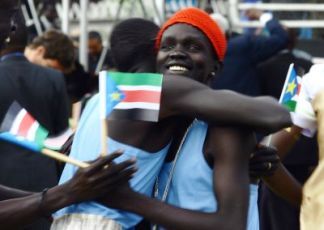Sudan’s CPA partners hand post referendum arrangements to AU
By Ngor Arol Garang
June 29, 2010 (ALEK) – The two partners to the accord dubbed as the Comprehensive Peace Agreement, signed five years ago to end one of the longest civil wars on the African soil, have agreed to handover the post-referendum issues and arrangements to the African Union’s High Implementation Panel for Sudan, says government’s official spokesman.

The two partners have resolved to involve AU and IGAD in the discussions, said minister Marial, expressing commitment of his party to peaceful settlement of the post referendum issues.
“SPLM is committed to taking part in fair and impartial discussions with the National Congress [Party] by anybody. We are actually accustomed to peaceful dialogue as best way to resolve differences in the Comprehensive Peace Agreement over the past years,” he said.
The leadership of the two parties had carried out lengthy and brainstorming discussions over the post-referendum issues and arrangements which started last year between Southern Sudan Vice President, Dr. Riek Machar and Sudan’s Vice President, Ali Osman Taha.
The reaching of a consensus that allows African Union (AU) play a key role in discussions between the two regions after a conduct of Southern Sudan referendum, which is widely expected to result to secession of Southern Sudan, is viewed by many as the best alternative to break the deadlock.
Others however see it as imposed foreign initiatives which may not be honored by the Sudanese stakeholders.
The consensus reached between the peace partners on Thursday 23, June, in the Ethiopian town of Mekele, shall be facilitated by AU’s High-level Implementation Panel for Sudan supported by IGAD, the Inter-Governmental Authority on Development and a regional grouping, the IGAD partners’ forum as well as the UN.
Formed in 2008 by the AU’s Peace and Security Council to investigate the Darfur crisis, AUHIP is led by former presidents Thabo Mbeki of South Africa, Pierre Buyoya of Burundi and Abdulsalami Abu baker of Nigeria.
According to the same Memorandum of Understanding (MoU), signed after talks in Mekelle, Ethiopia, the post-referendum negotiations will be divided into four themes, each with their own working group on citizenship; security; finance, economy and natural resources as well as international treaties and legal issues.
The principles, guidelines and negotiation framework are due to be set out on 1st July, with the actual negotiations scheduled to start four days later.
However, national and international analysts viewed that AU, whose Constitutive Act enshrines as a founding principle respect of borders existing on achievement of independence, now finds itself in the somewhat contradictory position of overseeing arrangements that will probably culminate in the break-up of an African state.
AU is a signatory and guarantor of the 2005 Comprehensive Peace Agreement. Thus, many observe that while it has an obligation to do everything in its power to make unity attractive in Sudan, it is also bound to respect the right of self-determination. If it were to renege, the credibility of the institution would suffer in the region and beyond.
Since the CPA was signed in 2005, several international forums have sought to coordinate international involvement in its implementation, with varying degrees of success. The Assessment and Evaluation Commission (AEC) was established in October 2005 in accordance with the CPA, while other ad-hoc bodies have emerged more recently.
The “E6″ group, for example, is comprised of six special envoys representing China, the European Union, France, Russia, the UK and US. The E6 has begun meeting regularly – notably in Moscow last October and in Sudan in May – and issuing statements, which harness the collective political and diplomatic pressure of the nations and international bodies the six envoys represent.
On the fifth anniversary of the signing of the CPA in January this year, two men who played the role of midwifery in the peace process – Lt. Gen. Lazarus Sumbeiywo, the chief mediator, and former US Special Envoy, John Danforth – argued that “unless international support is significantly increased to help north and south agree on the foundations of their future, the elections and referendum may throw Sudan back into civil war”.
Others have equally pointed out that, the responsibility for a smooth CPA end game lies not only with international community and continental associations like the AU.
Coordinating international engagement is crucial, but it’s also important to remember that, first and foremost, it is Sudan’s two dominant parties that will be responsible for resolving the outstanding CPA agenda and preserving the peace. International actors can play a pivotal supporting role, though the trust and confidence of the parties is essential for any third-party engagement to bear fruit.”
Another issue is whether, despite having signed the Mekelle memorandum, the SPLM has complete faith in the AU, given the body’s past pro-unity stance.
There’s a historical legacy of mistrust, noted one western diplomat in Juba, who asked not to be named. The SPLM has come round to a large but not complete degree. They will want to balance the AU’s involvement by making sure that others such as the UN and Norway are involved,” he added.
However, the pressing issue now is the conduct of the referendum itself as time is running out with only less than six months left. A Southern Sudan Referendum Taskforce, under the chairmanship of the region’s Vice President, Dr. Riek Machar, has been formed to oversee its conduct and assist the technical commission Commission.
A part from the post-referendum issues, another sub-committee under the Taskforce is also formed to prepare the semi autonomous region for the governance and review of the interim constitution after 2011.
(ST)
